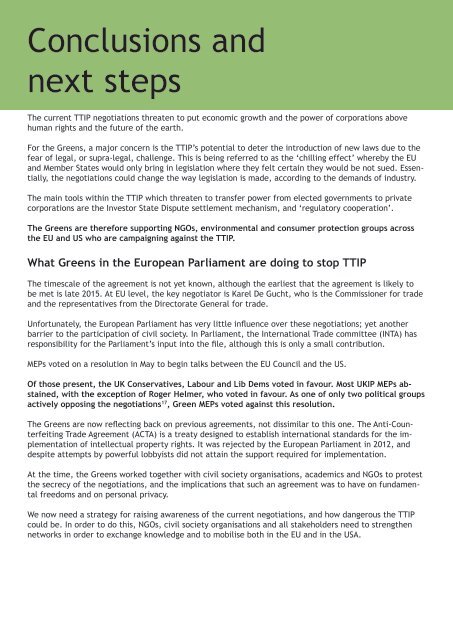TTIP FINAL
TTIP FINAL
TTIP FINAL
Create successful ePaper yourself
Turn your PDF publications into a flip-book with our unique Google optimized e-Paper software.
Conclusions and<br />
next steps<br />
The current <strong>TTIP</strong> negotiations threaten to put economic growth and the power of corporations above<br />
human rights and the future of the earth.<br />
For the Greens, a major concern is the <strong>TTIP</strong>’s potential to deter the introduction of new laws due to the<br />
fear of legal, or supra-legal, challenge. This is being referred to as the ‘chilling effect’ whereby the EU<br />
and Member States would only bring in legislation where they felt certain they would be not sued. Essentially,<br />
the negotiations could change the way legislation is made, according to the demands of industry.<br />
The main tools within the <strong>TTIP</strong> which threaten to transfer power from elected governments to private<br />
corporations are the Investor State Dispute settlement mechanism, and ‘regulatory cooperation’.<br />
The Greens are therefore supporting NGOs, environmental and consumer protection groups across<br />
the EU and US who are campaigning against the <strong>TTIP</strong>.<br />
What Greens in the European Parliament are doing to stop <strong>TTIP</strong><br />
The timescale of the agreement is not yet known, although the earliest that the agreement is likely to<br />
be met is late 2015. At EU level, the key negotiator is Karel De Gucht, who is the Commissioner for trade<br />
and the representatives from the Directorate General for trade.<br />
Unfortunately, the European Parliament has very little influence over these negotiations; yet another<br />
barrier to the participation of civil society. In Parliament, the International Trade committee (INTA) has<br />
responsibility for the Parliament’s input into the file, although this is only a small contribution.<br />
MEPs voted on a resolution in May to begin talks between the EU Council and the US.<br />
Of those present, the UK Conservatives, Labour and Lib Dems voted in favour. Most UKIP MEPs abstained,<br />
with the exception of Roger Helmer, who voted in favour. As one of only two political groups<br />
actively opposing the negotiations 17 , Green MEPs voted against this resolution.<br />
The Greens are now reflecting back on previous agreements, not dissimilar to this one. The Anti-Counterfeiting<br />
Trade Agreement (ACTA) is a treaty designed to establish international standards for the implementation<br />
of intellectual property rights. It was rejected by the European Parliament in 2012, and<br />
despite attempts by powerful lobbyists did not attain the support required for implementation.<br />
At the time, the Greens worked together with civil society organisations, academics and NGOs to protest<br />
the secrecy of the negotiations, and the implications that such an agreement was to have on fundamental<br />
freedoms and on personal privacy.<br />
We now need a strategy for raising awareness of the current negotiations, and how dangerous the <strong>TTIP</strong><br />
could be. In order to do this, NGOs, civil society organisations and all stakeholders need to strengthen<br />
networks in order to exchange knowledge and to mobilise both in the EU and in the USA.


